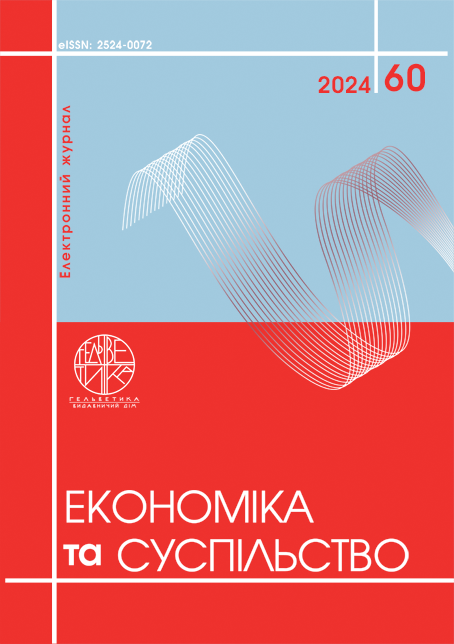APPLICATION OF ECOLOGICAL MARKETING TOOLS IN PROMOTING AGRICULTURAL PRODUCTS IN INTERNATIONAL MARKETS
Abstract
The purpose of the study is to characterize the specifics of applying ecological marketing tools to the promotion of agricultural products in international markets. In current conditions, ecological marketing, which emphasizes environmental benefits and safe production methods, becomes increasingly important specifically in the context of promoting agricultural products. This is due to the growing awareness of consumers about environmental issues and the demand for products produced in an environmentally friendly way. As the global community becomes more informed due to the pressure of digitalization, about climate change and the impact of agriculture on the environment, consumers actively seek products that align with their values and ideas. It has been proven that ecological marketing is of significant importance for the long-term viability of the agricultural sector. Sustainable farming methods promoted through ecological marketing are crucial for the preservation of natural resources. It is determined that ecological marketing supports the development of brand loyalty and a positive brand image on a global scale. In our opinion, ecological marketing is a comprehensive process that integrates environmental protection into the core of its product promotion strategy. It is established that the global popularity and success of agricultural products promoted through ecological marketing can have a ripple effect, encouraging broader adoption of sustainable practices throughout the agricultural sector. The main tools of ecological marketing are characterized. The determinants defining agricultural products in the international market are identified. The essence of ecological marketing tools lies in their ability to effectively promote all of the aforementioned attributes and imperatives. These tools vary from eco-labels and certificates that verify the environmental claims of a product, to green advertising and campaigns on social networks that raise awareness about the ecological benefits of certain products.
References
Jamal, F.N., Othman, N.A., Nizam, N.Z., Jelita, A., Rohmah, W., Dzakiyullah, N.R. (2022). Green marketing: Reviewing aspect of communication tools. International Journal of Sustainable Development and Planning, vol. 17, No. 4, pp. 1085–1092 [in English]
Bondarenko, A.F., Zakharkina, L.S., Syhyda, L.O., Saher, L.Y. (2020). The economic and marketing attractiveness of countries: Measurement and positioning in terms of economic security. International Journal of Sustainable Development and Planning, vol. 15, No. 4, pp. 439–449 [in English]
Dangelico, R.M., Vocalecci, D. (2017). Green marketing: An analysis of definitions, strategy steps, and tools through a systematic review of literature. Journal of Cleaner Production, 165: 1263–1279. [in English]
Bilan, Y., Lyeonov, S., Lyulyov, O., Pimonenko, T. (2019). Brand management and macroeconomic stability of the country. Polish Journal of Management Studies, 19(2): 61–74. [in English]
Chang, S.H. (2015). The influence of green viral communications on green purchase intentions: The mediating role of consumers’ susceptibility to interpersonal influences. Sustainability, 7(5): 4829–4849 [in English]
Yan, Y.K., Yazdanifard, R. (2014). The concept of green marketing and green product development on consumer buying approach. Global Journal of Commerce & Management Perspective, 3(2): 33–38. [in English]
Fátima, F., Gonçalves, A., Sandrina, T. (2021). Information technology adoption on digital marketing: A literature review. Informatics. 8(4): 74. [in English]
Ahmed, M.I., Kamalanabhan, T.J., Chih, P.G. (2001). Green marketing and its implications on consumers and business in malaysia - an empirical study. Journal of Human Ecology, 12(4): 245–249. [in English]
Ekhlassi, A., Maghsoodi, V., Mehrmane, S. (2012). Determining the integrated marketing communication tools for different stages of customer relationship in digital era. International Journal of Information and Electronics Engineering, 2(5): 761–765 [in English]
Shanmugam, G., Rajendran, D., Thanarajan, T., Murugaraj, S.S., Rajendran, S. (2023). Artificial intelligence as a catalyst in digital marketing: Enhancing profitability and market potential. Ingénierie des Systèmes d’Information, vol. 28, No. 6, pp. 1627–1636 [in English]

This work is licensed under a Creative Commons Attribution 4.0 International License.


